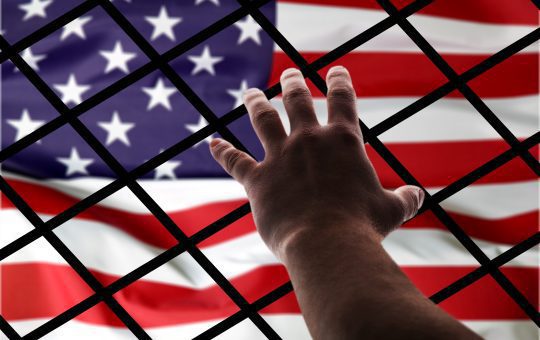Lawyers Volunteer to Aid Artesia Detainees
Looking for A Specific Post? Search Below.
Categories
Archives
Search
As a temporary detention center in Artesia fills with migrant women and children awaiting deportation hearings, a nationwide network of attorneys has rallied to provide them with pro bono representation.
About a dozen immigration attorneys from Colorado, Nevada, New York and Minnesota arrived in Artesia over the past week to fill what they say is gap in access to legal aid. The oil and gas town in southeastern New Mexico lies more than three hours from the urban centers of Albuquerque and El Paso, where most immigration attorneys in the region practice.
“There has been no shortage of volunteers and no shortage of cases,” said Olsi Vrapi, an Albuquerque immigration lawyer and University of New Mexico law professor who has coordinated the effort locally alongside the Washington, D.C.-based American Immigration Lawyers Association.
Another group of attorneys flies in from Oregon next week, according to organizers. Most of the volunteers speak fluent Spanish, although volunteer translators have arrived, as well.
How to Help
Immigration attorneys who wish to volunteer can write to artesia@aila.org.
U.S. Immigration Customs Enforcement opened the makeshift detention center last month inside the Federal Law Enforcement Training Center, where Border Patrol agents get their training.
Migrant women and children from Central America are being transferred to Artesia from south Texas as part of the Obama administration’s effort to combat a perception at home and abroad that undocumented immigrants are being treated with leniency.
More than 160 women and children have been deported from the Artesia facility so far, according to Rep. Steve Pearce, R-N.M.
Immigration attorney Jennifer Smith drove 10 hours to Artesia from Glenwood Springs, Colo., last week. She said she volunteered because “it was too heartbreaking not to.”
She said the volunteers – who have set up shop in a conference room of the Artesia Chamber of Commerce – face challenges in representing the detained women and children, including difficulties gaining admission to the detention center and getting face time with clients.
“We have had a lot of trouble getting to see our clients in the detention center,” she said.
ICE has said that all migrants detained in Artesia are provided a “know your rights” legal presentation and may access phones to speak with an attorney.
Attorneys are permitted to represent clients in person during asylum interviews and immigration hearings; however, advocates charge that ICE has kept them waiting for hours to enter the facility or to see clients, or has shuffled detainees through proceedings without an attorney present.
Vrapi, who has been retained professionally by four Central American women held in Artesia, said the detention center is holding asylum interviews and deportation hearings seven days a week.
Pearce said the facility is nearing its 700-person capacity.
“As soon as we found out about the family detention center in Artesia, we knew access to legal counsel would be a big issue,” said Anu Joshi, grass-roots advocacy associate with AILA in Washington.
“We are setting up a system for the next four weeks to six months – however long it takes,” she said. “Unfortunately, the (Obama) administration has signaled that they want to continue with family detention, and we think we’re going to have a need at Artesia for these mothers and children to be represented for the foreseeable future.”
Copyright © 2014 Albuquerque Journal
Share this post:
Client Success Stories:
Navigating Immigration

Schedule A Consultation Now
Your future is too important to wait. Whether you’re reuniting with loved ones or facing immigration
challenges, we’re here to help. Fill out the form below for a confidential consultation, and let’s start
your journey today. Contact us now—your future begins here.




